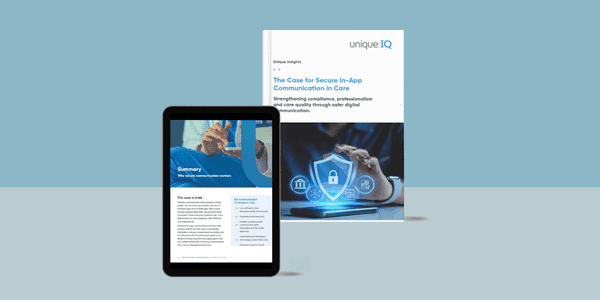
The Case for Secure In-App Communication in Care
Digital communication has become central to how care is delivered. Messages are shared quickly, information flows easily and care teams can stay connected throughout the day. But convenience should never come at the cost of security or professionalism. As more care providers rely on consumer messaging tools, the need for secure in app communication has never been more important.
Download your copy of Secure in-App Communication in Care
To help care providers navigate this critical area, we have developed a comprehensive whitepaper packed with expert insights. Simply fill in your details below to access your copy of our guide to The Case for Secure In-App Communication in Care. A copy of your guide will be emailed to you.
The Risks of Consumer Messaging Apps
In care settings, communication is not simply a tool for efficiency. It is a cornerstone of safe, effective and compassionate care. While apps like WhatsApp or SMS may feel convenient, they carry significant risks around data security, compliance and professional boundaries. Many providers still rely on consumer messaging apps to share updates, organise visits and respond to urgent situations. While these tools may feel convenient, they also create serious challenges for care organisations.
Uncontrolled messaging channels increase the risk of sensitive information being shared outside of secure systems. They can blur the boundaries between personal and professional life for staff, expose providers to regulatory breaches and make it difficult to maintain clear oversight. In short, they place pressure on teams and leave organisations open to unnecessary risk.
When Staff Leave, the Data Stays Behind
One of the most overlooked issues with consumer messaging is what happens when employees leave. If staff have been using personal messaging apps to communicate about clients or services, sensitive information can remain on their personal devices, long after their employment ends.
This creates multiple risks for providers:
- Loss of control over sensitive data including client details, schedules and care notes.
- Regulatory exposure if data is shared, accessed or leaked.
- Reputational damage from an inability to guarantee secure handling of client information.
- No audit trail for critical communication once individuals leave the organisation.
- Potential breaches of GDPR and CQC standards, putting the organisation at serious compliance risk.
A secure in-app communication platform ensures that when a staff member departs, their access is revoked instantly, keeping data within the organisation’s controlled environment.
A Safer, More Accountable Way to Communicate
Our new white paper, The Case for Secure In App Communication in Care, explores why it is time for providers to move beyond everyday messaging apps and embrace a communication solution that is designed for the realities of care delivery. It explains how secure in app messaging protects data, strengthens compliance and creates a safer working environment for staff and service users alike.
Inside the white paper you will find:
- Key compliance challenges linked to consumer apps
- How secure in app tools bring oversight and protect sensitive data
- The impact of communication on staff wellbeing and role clarity
- Benefits for providers, clients, families and regulators
- Practical steps to strengthen communication in your organisation
Secure communication is more than a technical upgrade. It is an investment in quality, trust and accountability. With the right tools in place, care providers can reduce risk, support their teams and strengthen the confidence of those they support.
Ready to take the next step?
Book a demo or talk to us and discover how our platform can transform your communications.